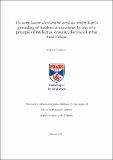The starry heavens above and the moral law within : Kant’s grounding of freedom in experience by way of a principle of intellectual causality, discovered in his third Critique
Abstract
Kant claims in his third Critique (1790) to have proven that the idea of freedom is scibilium, known with certainty. My aim is simply to take his claim seriously. This involves the attempt, which Kant himself suggests in the first Critique is key to properly understanding a philosopher, to form a plausible ‘idea’ of his system. I do so by interpreting it according to the end that he claims. I contend that Kant realises this claimed outcome by demonstrating the necessary effects of a purely intellectual causality in a certain kind of experience in inner sense: pleasure in beauty. This, I argue, then allows him to complete his proof of the reality of freedom. I also present evidence to suggest that Kant knew what must be involved in this proof much earlier than is generally conceded. It is also my view that this interpretation is of no detriment to the consistency of his philosophical system as a whole; in fact, it allows an understanding that fits with his claims. The arguments involved in this thesis involve opposing the majority view that certain concepts appeared first in Kant’s third Critique and must also challenge accepted perspectives on parts of Kant’s other relevant works. It will be necessary to examine aspects of Kant’s epistemology and metaphysics, his empirical psychology, aesthetics, and his moral and theoretical philosophy. In such a broad body of work as Kant’s, it can be easy to become overwhelmed and lost, or even to find corroboration for views that are at odds with the general trend of his thinking. In a best attempt to avoid this, I will throughout regulate my own idea of his system and constrain my investigations by remaining conscious of his claims, i.e., by way of a thread tethered to Kant’s own claimed conclusion.
Type
Thesis, MPhil Master of Philosophy
Rights
Creative Commons Attribution-NonCommercial-NoDerivatives 4.0 International
http://creativecommons.org/licenses/by-nc-nd/4.0/
Collections
Except where otherwise noted within the work, this item's licence for re-use is described as Creative Commons Attribution-NonCommercial-NoDerivatives 4.0 International
Items in the St Andrews Research Repository are protected by copyright, with all rights reserved, unless otherwise indicated.
Related items
Showing items related by title, author, creator and subject.
-
The foundations of linguistics : mathematics, models, and structures
Nefdt, Ryan Mark (University of St Andrews, 2016-11-30) - ThesisThe philosophy of linguistics is a rich philosophical domain which encompasses various disciplines. One of the aims of this thesis is to unite theoretical linguistics, the philosophy of language, the philosophy of science ... -
Plato on time as a cosmic phenomenon
Lazzarini, Lorenzo (University of St Andrews, 2020-07-27) - ThesisThe thesis presents an original interpretation of the account of time in the Timaeus (37c6-39e2), arguing that time in Plato is best conceived of as a cosmic phenomenon. In Part I, my view is contrasted in crucial respects ... -
Introduction to the Special Issue on Lakatos’ Undone Work
Nagler, Sophie; Pillin, Hannah; Sarikaya, Deniz (2022-04-22) - Journal articleWe give an overview of Lakatos’ life, his philosophy of mathematics and science, as well as of this issue. Firstly, we briefly delineate Lakatos’ key contributions to philosophy: his anti-formalist philosophy of mathematics, ...


